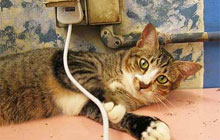 As many as 40 percent of cat bites become infected and require medical care. This information is not intended as a substitute for professional medical advice or treatment.
As many as 40 percent of cat bites become infected and require medical care. This information is not intended as a substitute for professional medical advice or treatment.
Steps:
1. Clean the wound immediately with lots of soap and water, rubbing alcohol, or hydrogen peroxide.
2. Put pressure on the wound to stop the bleeding.
3. Hold the wound above your heart if the bite is on your hand or arm.
4. Place a clean bandage over the wound.
5. Assess the wound for signs of infection: unusual redness or swelling, increasing warmth in the area, red streaking, or fever. See a doctor if signs of infection develop.
6. Get a tetanus shot if your primary series is incomplete or if it has been more than five years since your last shot.
7. Determine the rabies vaccine status of the cat. The cat should be observed for 15 days to see if it develops signs of rabies if its vaccine status is uncertain. Rabies is a virus that can be fatal if a
vaccine is not administered in time.
Seek medical care if the wound is gaping, if bleeding does not stop within 15 minutes, or if you have specific medical conditions or concerns. This information is not intended as a substitute for professional medical advice or treatment.
If you are bitten, and the wound is deeper than just a small break in the skin, go to an Emergency room as soon as possible. Cats have sharp teeth and a bacteria in their mouths called pasteurella. When they bite hard, their sharp teeth act almost like a needle puncture pushing the pasteurella deep into the muscle. Because their teeth are also small, the wound may close over right away, trapping the bacteria in.
Pasteurella is an anaerobic bacteria – it grows in the absence of oxygen. The infection happens very quickly and can be very painful, even when properly treated.
Seeking treatment immediately will save you a lot of pain. Many people who have bad bites and don’t seek treatment end up with throbbing pain, a fever, a bad infection, and eventually an IV, antibiotics and a partial cast. Don’t wait! If you are bitten go to the doctor right away!
One of our students told me that she was once scratched by her cat (she was lamenting not having read our “Secrets of Cat Training” manual sooner). The scratch became very red and itched a lot. She went to the doctor and found out she had Cat Scratch Fever. This is very rare, but remember that you CAN get it! So please play it safe and seek proper medical treatment (even if its just a visit to the doctor the next day).
One of the best sites that shows you all of this and more is Ultimate Cat Secrets, put together by top Cat Trainer, Mary Mathews. Click here for more information




